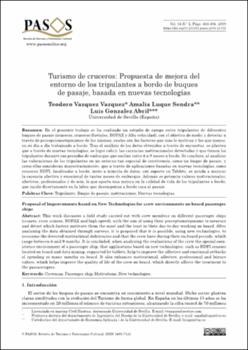Turismo de cruceros: Propuesta de mejora del entorno de los tripulantes a bordo de buques de pasaje, basada en nuevas tecnologías
Date
2018Abstract
En el presente trabajo se ha realizado un estudio de campo entre tripulantes de diferentes
buques de pasaje (cruceros, cruceros fluviales, ROPAX y Alta velocidad), con el objetivo de medir y detectar a
través de percepciones/opiniones de los mismos, cuales son los factores que más le motivan y los que menos,
en su día a día trabajando a bordo. Tras el análisis de los datos obtenidos a través de encuestas, se plantea
que a través de nuevas tecnologías, se logre cubrir las carencias motivacionales detectadas y que tienen los
tripulantes durante sus periodos de embarque que oscilan entre 6 a 9 meses a bordo. Se concluye, al analizar
las valoraciones de los tripulantes en un entorno tan especial de convivencia, como un buque de pasaje, y
como ellos consideran mayoritariamente, que a través de aplicaciones basadas en nuevas tecnologías, como
sensores RDFI, localizados a bordo, junto a minería de datos, con soporte en Tablets, se ayuda a mejorar
la carencia afectiva y emocional de tantos meses de embarque. Además se potencia valores motivacionales,
afectivos, profesionales y de ocio, lo que aporta una mejora en la calidad de vida de los tripulantes a bordo,
que incide directamente en la labor que desempeñan a bordo cara al pasaje. This work discusses a field study carried out with crew members on different passenger ships
(cruises, river cruises, ROPAX and high speed), with the aim of using their perceptions/opinions to measure
and detect which factors motivate them the most and the least in their day-to-day working on board. After
analyzing the data obtained through surveys, it is proposed that it is possible, using new technologies, to
overcome the detected motivational deficiencies and that the crew have during their on-board periods, which
range between 6 and 9 months. It is concluded, when analyzing the evaluations of the crew the special coex‑
istence environment of a passenger ship, that applications based on new technologies, such as RDFI sensors
located on board and data mining, supported by tablets, help to improve the affective and emotional setbacks
of spending so many months on board. It also enhances motivational, affective, professional and leisure
values, which helps improve the quality of life of the crew on board, which directly affects the treatment to
the passasengers.





